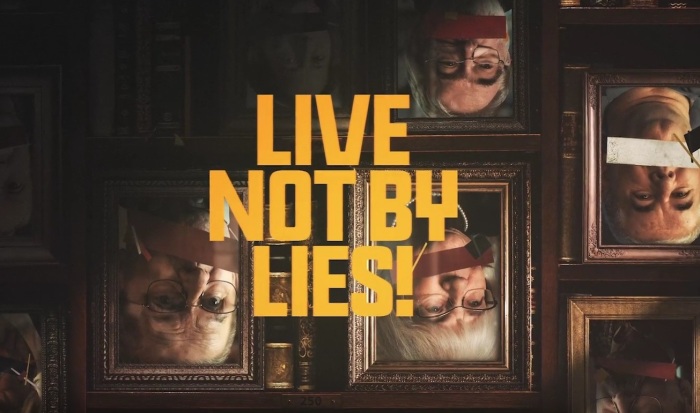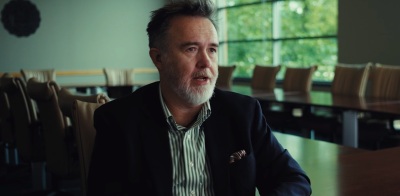
Bestselling conservative author and editor Rod Dreher released a book in 2020 titled Live Not by Lies: A Manual for Christian Dissidents, which argued that a rising “soft totalitarianism” is threatening the United States and Europe.
Five years later, a four-episode documentary miniseries of the same name based on Dreher’s book has been released via Angel Studios.
As with Dreher’s work, the series gets the perspectives of people who lived under totalitarian regimes, namely former countries of the former Soviet Union, while drawing parallels to forces within 21st-century American society.
“How did people fall under the spell of leaders like Hitler, Stalin, Pol Pot, and Mao?” asked the narrator in the first episode of “Live Not By Lies.”
“And how does the public participate in and support such horrific acts? The short answer is the telling and believing of lies. And the solution to this mass delusion is preaching the opposite.”
In addition to interviewing dissidents from the former Soviet Union, the series also interviews various scholars, activists and writers, including Dreher himself.
The Christian Post spoke with Dreher about “Live Not By Lies” and related topics. Below are excerpts from that interview.
CP: What role did you play in adapting your book into a documentary series? What input did you have on what was mentioned and not mentioned?

Dreher: It was fairly minimal, to be honest. Obviously, I provided the source material, and I provided some introductions in Prague and in Bratislava to the underground Church.
But mostly this was the work of Isaiah Smallman, the director. But I’m pleased with what he’s done. He wrote the film himself, and it’s somewhat different from the approach I took in my book, but I’m very pleased with it. I think he’s a good storyteller.
CP: How does the documentary contrast with your 2020 book?
Dreher: [Isaiah Smallman] added some material from Romania, which I thought was good, but mostly, the book itself is a bit more methodical in laying out the elements of soft totalitarianism.
Isaiah, he does do that, but it’s simply a matter of format. Mine is just more methodical, as you would expect from a book, and he leans more heavily into the emotional side of it. That’s not to say that he doesn’t fill it with facts.
It’s really more of a style matter.
CP: During the documentary, there was some focus on the issue of book bans and how dissidents in communist countries would print and distribute forbidden books. As you know, there are a lot of debates in America over what books should be allowed in public libraries and public schools. Do you believe these issues are comparable to the communist book bans?
Dreher: Not really.
Every society will decide what can and can’t be seen publicly. In the United States, to use an extreme example, we don’t allow child pornography. And, of course, there’s a very good reason for that.
And so, I think people who believe that everything should always be freely available, I think that that’s completely unrealistic. That said, under communism, the bans were across the board. They were about politics, anything political, anything that violated the governing ideology was banned.
That’s not what we’re dealing with in the U.S. They’re not really bans. You can still buy these books. You just can’t necessarily teach them in elementary schools.
A free people can debate what we want our kids to be exposed to. That’s not the same thing as a government deciding undemocratically to do a unilateral ban on entire categories of books, especially with political books, that contradict the ideology.
It’s very easy for activists when they see a school board, say, not wanting to have gender ideology books available for elementary school children; it’s easy for them to say, “Aha, totalitarianism!”
That’s not what that is. That’s simple democratic decision-making. If our government decided to make all books of gender ideology for every single person illegal, that would be totalitarianism.
CP: In episode three, there was talk about how “comfort is the new gulag.” How can Americans stop the comforts that come with modern life from making them complacent about totalitarianism?
Dreher: A happy life is not a life that is without friction. Sometimes you can be unhappy within a happy life.
A truly human life is a life that necessarily has suffering in it. It can be great suffering; it can be trivial suffering.
But you have to suffer; that’s what makes us human. And learning how to deal with suffering is what makes us human. My contention in Live Not By Lies is that that is the defining aspect of the soft totalitarianism we’re dealing with here.
If we think of totalitarianism using the Soviet model or Orwell’s 1984, that’s hard totalitarianism. We don’t have that. And so, people might wrongly conclude that we are not dealing with totalitarianism.
Aldous Huxley’s version in Brave New World, that’s much more like what we’re dealing with. And this is a system in which you can manufacture consent of the governed by making them very comfortable and then threatening to take away their comfort if they don’t go along with whatever the ideology demands.
How can we make people more resilient?
I think the main thing for Christians to know is we have to stop being so therapeutic in our approach to the faith. We have to stop making people think, making Christians think that a happy life is one that has no suffering in it. Our Lord suffered and died on the cross for our salvation. If we want to imitate our Lord, we have to be able to accept suffering and allow it, in some sense, to transform us, to make us more holy, to make us more compassionate.
Avoiding suffering at all costs is the problem.
We think that compassion is the ultimate truth that we must ultimately all push for. And if somebody is in distress, if someone is suffering, then we have to do everything possible to relieve their suffering. That is the only compassionate thing to do.
That’s how we talk ourselves into endorsing things like puberty blockers for children, cutting the breasts off of girls. I mean, that’s just one example, but if we divorce compassion from ultimate truth, then we’re in serious trouble.
I think that one thing, too, that Christians can do is to get themselves, especially their children, offline.
We all have to be online for some stuff, but to limit our time online, because what being online does is it formats the brain in such a way that it makes you unconsciously start to think of all reality as malleable, as plastic. I think it’s no coincidence that the first generation that was raised entirely online digitally is also the one within whom transgenderism has exploded. And I think that we will see our society, which is now completely digital, as it proceeds, we will see more and more ideologies like gender ideology break out.
It is shocking to hear how antisemitism has become really common among young men of college age. And it is all coming at them, according to my sources, from online. They’re being all radicalized online. This, I think, is another canary in the coal mine about how vulnerable we all are to radical ideologies of the left and the right.
CP: When referencing modern totalitarianism, the documentary cited examples like a pro-life activist being arrested for silently praying outside an abortion clinic, so-called “gender affirming care,” violent radical protests and strict COVID-19 lockdown measures, which to my knowledge are all progressive-leaning actions. Do you believe there are any examples of rising totalitarianism among right-wing ideology in America?
Dreher: I would say that the rise of antisemitism on the right is a good example. We’ve seen this on the left for the past few years, but now it’s coming very hard from the right. And the churches seem completely flatfooted in the face of this.
I myself am a conservative, but we think that because Donald Trump is in power and he has had a lot of great pushback against wokeism and these forms of soft totalitarianism on the left, that that’s going to solve the problem. It’s not going to solve the problem.
As much as I support that, we can’t afford not to be vigilant against this on our own side.
Just because left-wing soft totalitarianism has been dominant does not mean that we on the right are not susceptible to it. So, we need to be very careful in policing ourselves and our own communities to avoid that.
I don’t want to be ruled by a right-wing totalitarianism, soft or hard, any more than I want to be ruled by a left-wing version.
I think that the loss of community is a big part of it. I would also say that the churches have really failed in trying to understand the signs of the times. I’m not talking about the liberal churches, I’m talking about conservative ones.
I found that, in my own research and my own experience that, a lot of people, American Christians, conservative Christians, tend to think of these things in terms that make sense when they were kids.
If you’re a Baby Boomer, you might think that this was simply a matter of politics and if you get the politics right, everything will be well. That’s just not true.
Or, pastors are afraid of conflict, and they don’t want to talk about these things.
We have to be careful about this, but in the end, you have to confront this stuff.
The kinds of issues we’re talking about with soft totalitarianism have less to do with pure politics and more to do with the argument over what is real. The Church does have a lot to say about it, but if church leaders, including lay leaders in the Church, keep their heads in the sand about it, and either ignore it or misinterpret the phenomenon, or the various forms of this phenomenon, we’re going to lose our kids.








